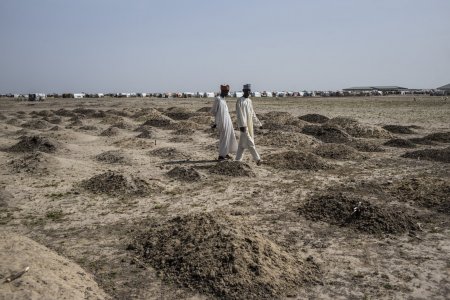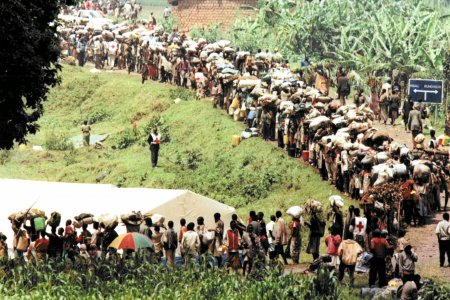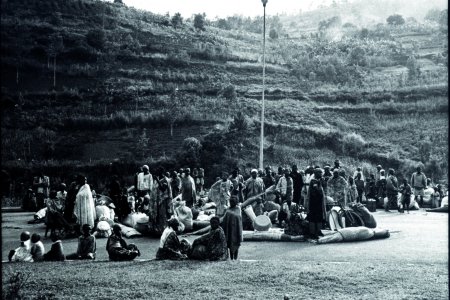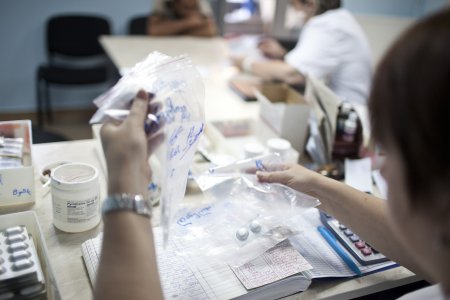 Sylvain Cherkaoui/COSMOS
Opinion
Sylvain Cherkaoui/COSMOS
Opinion
06/25/2018
Fabrice Weissman
The crude mortality rate (CMR) is one of the most widely used indicators at MSF and the humanitarian sector to evaluate the severity of a health crisis within a given population. It is widely recognized that a CMR equal to or greater than one death per 10,000 persons a day signifies an emergency situation requiring an immediate response. However, the usage of the standard emergency threshold as “1/10,000/day” is very questionable: it goes against the official recommendations endorsed by humanitarian organizations and ignores the worldwide decline in mortality rates over the last 30 years.
 John Parkin
Opinion
John Parkin
Opinion
06/06/2018
Claudine Vidal
Published in March 2018, Judi Rever’s investigative work, In Praise of Blood, quickly garnered international attention. It is an indictment of both the Rwandan patriotic front (RPF) and its leader, current Rwandan president Paul Kagame, and foreign governments and international institutions – the International Criminal Tribunal for Rwanda (ICTR), in particular – that allowed crimes committed against Hutu civilians to go unpunished.Judi Rever’s book is more than a work of investigation. It reads like a prosecutor’s closing argument: the massacres are described in such a way as to classify them as genocide. And it is precisely this combination of investigation and the pursuit of evidence that would stand up in a court of law that is problematic.
 Xavier Lassalle/MSF
Opinion
Xavier Lassalle/MSF
Opinion
04/05/2018
Jean-Hervé Bradol
The publication of the journalist Judi Rever’s book, In Praise of Blood, on the crimes committed by the Rwandan Patriotic Front’s armed rebellion has rekindled discussion over the existence of a “double genocide”, one committed against the Tutsis under the orders of Rwanda’s interim government which took power in April 1994 following the assassination of President Habyarimana, and the other against the Hutus by the Rwandan Patriotic Front (RPF) which seized power in July 1994. There is little or no controversy about the reality of the genocide of the Tutsis in the world of Rwandan studies, but the claim that the Hutus were in turn victims of genocide sparks reactions as violent as they are confused. The cause of this confusion can be found in the different definitions of a term used in at least three fields: history, law and politics.
 Opinion
Opinion
10/23/2017
Marc Le Pape
How can anyone write about Rwanda without being called a denialist? Marc Le Pape tries to craft an answer in this article, published on the website The Conversation on 19 October 2017.
 Opinion
Opinion
03/06/2017
Rony Brauman
There can scarcely be any more sensitive marker of geopolitical transformations than the refugee. Not the individual refugee as such, but the phenomenon of refugees, the representations that make them visible and the discourse around them. From this point of view, 2016 was a year of upheaval, the like of which Europe had not seen since the war in the former Yugoslavia.
 Opinion
Opinion
10/01/2004
Rony Brauman
Rony Brauman decribes how the qualification of the conflict in Darfur as genocide leads only to a dead end and warns against the abuse of this concept.
 Opinion
Opinion
12/11/2011
Rony Brauman
Rony Brauman discusses several aspects and issues related humanitarian action as well as the good reasons to wish Médecins sans frontières a happy 40th anniversary.
 Opinion
Opinion
03/01/2009
Rony Brauman
Humanitarian law was designed as a normative framework, not as an indictment. With this in mind, Rony Brauman tries to define what constitutes a human shield.
 Opinion
Opinion
09/10/2010
Rony Brauman
Rony Brauman criticises the International Criminal Court's indictment of the Sudanese president for genocide. If the prosecutor's argument is followed, humanitarian organisations working in the displaced people's camps should be charged with complicity in genocide.
 Opinion
Opinion
03/09/2012
Rony Brauman
Considering that the United Nations juridictions officially recognises six genocides, Rony Brauman considers unjustifiable the fact that the French Parliament only recognises . The only alternative is to recognise all of them or none.
 Daro Sulakauri
Opinion
Daro Sulakauri
Opinion
12/01/2009
Rony Brauman
Pharmaceutical companies produce drugs and are increasing involved in the clinical trials of these products. This conflict of interest is incompatible with the expectations of Public Health. Rony Brauman suggests that the industry no longer be responsible for therapeutic trials.
 Opinion
Opinion
08/16/2004
Fabrice Weissman
Fabrice Weissman reminds us that while the clarity of the humanitarian emblem is no guarantee of absolute safety, it is nevertheless an essential prerequisite to it.




